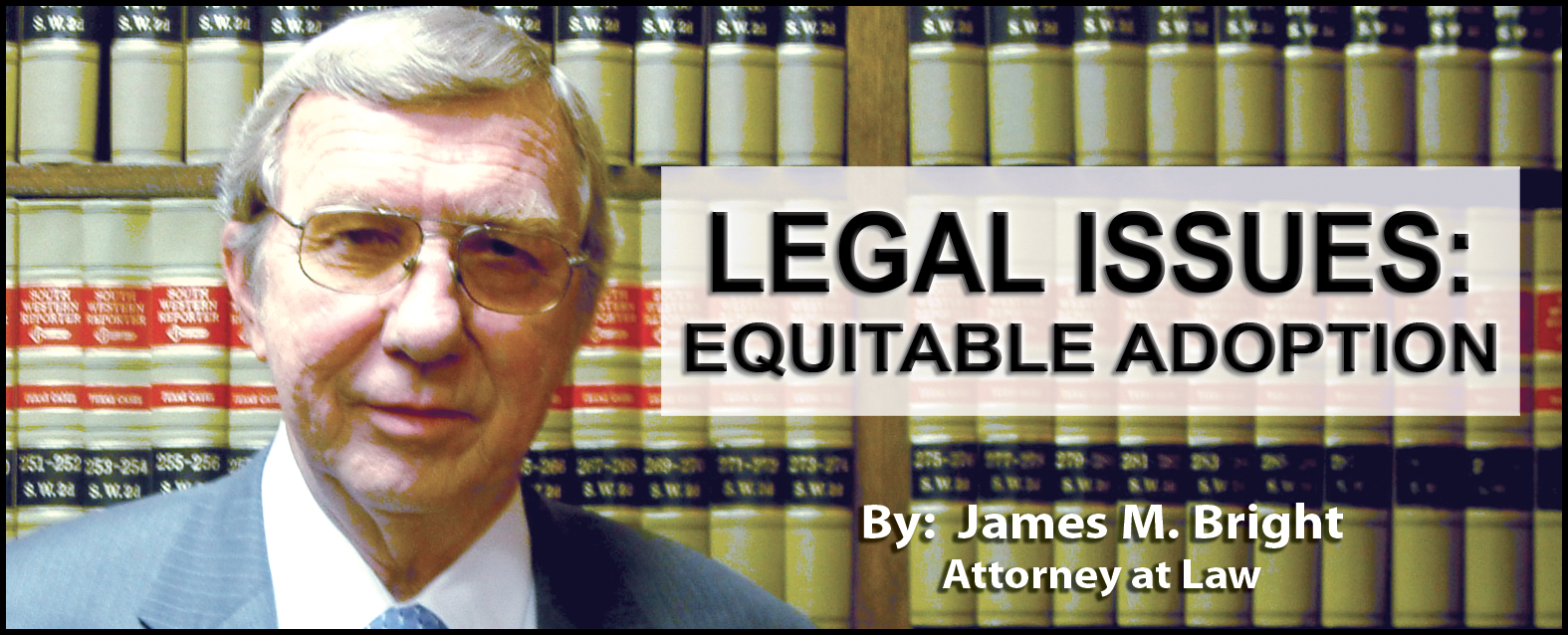The following is provided for informational purposes only and is not, nor should it be construed as legal advice.
Most Texas residents are aware that their conduct can lead to the possible imposition of status as a “common-law” or “informal” marriage. Not as well-known, and not receiving the same amount of attention, is the concept of equitable adoption, also sometimes called adoption by estoppel. A finding of equitable adoption by the court places a child in the same position to inherit property as if he/she had been formally adopted or had been a natural child.
This status sometimes occurs when someone has taken a child into his home, either as a stepchild or otherwise, nurtured the child and treated him as if the child were his own. Historically, there have been three elements which needed to be proven before a child could enjoy the position of being adopted by estoppel. Those elements are:
- The existence of an agreement by the adoptive parent(s) that they agreed to adopt. This agreement need not be in writing, but may be implied by the actions of the parties. This agreement may be proven by either direct evidence or circumstantial. Arguably, it is because there is no exact legal test for the existence of an agreement that the courts of appeal are not always consistent in their decisions. For example, a minority of the courts have required that both natural parents consent to the adoption, while a majority of the courts have held that an equitable adoption may occur even if the natural parent does not consent. Willingness &/or intent of the adoptive parent to enter into an agreement is typically the element of proof that is the most difficult for a person seeking equitable adoption to establish.
- Performance by the child which provides consideration for the agreement by the adoptive parent. Reportedly, this is usually the easiest element to establish in support of equitable adoption. This can be shown by examples of love shown to the parent.
- Reliance – Although no longer considered a necessary element of proof, historically the child had to know of the agreement to adopt and then to act in reliance upon it.
The Texas Court of Appeals case of Spiers v Maples, 970 S.W. 2d 166 (Tex. App.–Fort Worth 1998) helps to clarify the required elements, and it, along with a line of other cases established that the third element of proof (reliance by the child), is no longer needed to establish adoption.
A “bare-bones” and brief synopsis of the facts in the Spiers case is as follows:
- Cross (the child) was given to Moody (the adoptive parent) at a very young age by Cross’s natural mother.
- Moody reared Cross as her own child.
- Cross attended school and was enrolled as if Moody was her natural mother.
- Cross did not find out that Moody was not her mother until she was 21 years of age and ordered her birth certificate in anticipation of getting a marriage license.
- Moody and Cross celebrated all holidays and birthdays as a family.
- Cross had no memories of being anywhere other than with Moody as her mother until she married at age 21.
- Cross treated Moody as if she were her mother, taking care of her when she was ill and providing her with love and affection.
- Moody listed Cross on her tax returns as a dependent child.
- Moody died without a will.
- When Moody died, a claim was asserted by Moody’s sister and brother that they were the only heirs of Ms. Moody’s estate because Cross had never been formally adopted.
- The trial court held, and it was affirmed by the Court of Appeals, that not only had Cross been equitably adopted, but also that she was the sole heir of Moody.
Although the Spiers court held that equitable adoption existed, the holdings between courts have not been consistent. In some of these cases, being with alleged adoptive parents from an early age, referring to them as “mommy” and “daddy,” attending school under the alleged adoptive parent’s name was not conclusive. In many of these cases, the claim for equitable adoption failed. These cases are typically decided upon the smallest of differences in distinguishable fact.
A later Texas Court of Appeals case Dampier v. Williams, 493 S.W.3d 118, 121-122 (Tex. App.-Houston [1st Dist.] 2016, no pet.) swings the pendulum back from Spiers and insists that the age of the child might also be of some consequence. The Dampier case can be distinguished because the attempted equitable adoption was by an adult who did not meet the decedent until the claimant was 19 years old and the decedent was about 49 years old.
Based upon case law, it is clear that children reared by parents who are not their natural parents may have intended or unintended consequences on how that parent or alleged parent’s estate passes upon the parent’s death. The importance of this issue is enhanced greatly when the courts are dealing with blended families. The bottom line, as always, is if you wish to include or exclude a child from inheriting the property that you own at the time of your death, you need to hire an attorney to draft the will that clarifies your intent.
James Bright has been admitted to practice before the Federal Courts for the Southern District of Texas and Eastern District of Texas as well as all of the Justice Courts, Probate Courts, County Courts at Law, District Courts, Courts of Appeal and Supreme Court for the State of Texas. He maintains an office in Houston and by appointment another at 208 McCown Street in the heart of historic Montgomery. Contact may be made by telephone (936) 449-4455 or (281) 586-8277. For more information about wills or probate in Texas, please see- www.houstontxprobate.com
IF YOU WISH TO SUGGEST A TOPIC FOR THIS COLUMN, SEND TO:
JAMES M. BRIGHT
14340 TORREY CHASE BLVD., SUITE 150
HOUSTON, TEXAS 77014
Email: [email protected]





